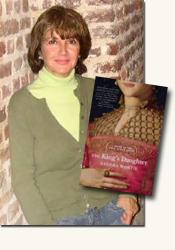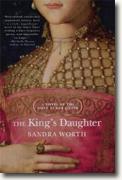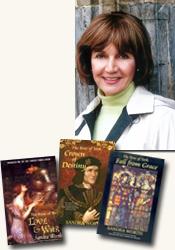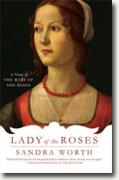author interview
book reviews:
· general fiction
· chick lit/romance
· sci-fi/fantasy
· graphic novels
· nonfiction
· audio books
· author interviews
· children's books @
curledupkids.com
· DVD reviews @
curledupdvd.com
newsletter
win books
buy online
links
home
for authors
& publishiss
for reviewers
The maga Portunista and her colorful subcommanders lead a ragged, outnumbered brigade in the wake of an international war, against her increasingly ruthless adversaries. But the ambitious commander finds herself irreconcilably drawn to a charismatic, kind and hopeful stranger. Click his e for more on Cry of Justice or read our review.
|
|||||
 
Luan Gaines interviewed author Sandra Worth about
investigating the first Tudor queen, Richard III's bad historical rap, and the trials suffered by the woman who would become known as Elizabeth the Good in The King's Daughter Interviewer Luan Gaines: What inspired you to write The King's Daughter Sandra Worth: The short answer is that I wrote the book on Elizabeth of York because I wanted to know more about her and couldn’t find anything except a few old novels and a biography that left much to be desired. The long answer is below.
What roles do Edward IV, Elizabeth’s father, and her uncle, Richard III, play in Elizabeth’s formative years? Edward IV was a warm, loving man and an adoring father, especially of his beautiful first-born daughter. Elizabeth must have reciprocated her father’s love and affection in view of her mother’s cold, abrasive and domineering personality. As for her uncle, Richard of Gloucester, she barely knew him as a child since he chose to live in the north and avoided court. After her father’s death, when Richard became Protector, she went into sanctuary with her mother. During this time he deposed her brothers and proclaimed her a bastard. It is not difficult to imagine how she felt about that. After Edward IV’s death, Bess Woodville, Edward’s wife, tries to grab power from Richard, designated Protector of the Realm by King Edward. How does Woodville’s ambition contribute to her confinement in sanctuary and the enmity of Richard of Gloucester? Elizabeth Woodville represents one of the most destructive forces of the period. Vindictive, avaricious, and supremely ambitious, she gave the realm ample reason to detest her. By the time of his death, Edward IV clearly knew that she had been the worst mistake of his life. He excluded her from his will and appointed Richard regent of the realm in her place. Fearing Richard would punish her for trying to set aside her husband’s will and seize power for herself, Elizabeth fled into sanctuary with her daughters. It was Elizabeth’s machinations and plots during this fragile time in England’s history that sealed the fate of her sons, doomed the valiant Plantagenet dynasty that had ruled England for nearly four hundred years, and brought the Tudors to power. Isolation is a common theme for Elizabeth of York, years of sanctuary with her mother and siblings, virtual imprisonment as Henry’s wife in his court. Do the long years of isolation affect Elizabeth’s world view and the choices she makes? Elizabeth understands suffering, because she has suffered herself. Loss, loneliness, deprivation – all these have been part of the formative years of her young life. She wanted peace for her country and realized that only her union with Henry Tudor could bring an end to war. Once queen, it became apparent that her role would not be a traditional one. In fact, she found herself queen in name only, her power severely restricted. Yet she did what she could to bring others the happiness that was denied her. In this way, by rising above the circumstances of her life, Elizabeth proved herself a queen for the ages. During her formative years, Elizabeth has been told that her uncle Richard is an enemy of the family’s fortunes, and is made fearful of him by Woodville’s carping on Richard’s ambitions. How then does Elizabeth overcome her first impressions and fall in love with the man who becomes king in place of her brother? Her relationship with her uncle is complex. Her father loved and trusted Richard of Gloucester; her mother hated and distrusted him. As mentioned above, after her father’s death, when Richard became Protector, Elizabeth went into sanctuary with her mother. During this time he deposed her brothers and proclaimed her a bastard.
An excellent question, Luan – one no one has asked me before. Had he lived. It is tempting to consider what might have been - had he lived.
Can you describe a brief history of the War of the Roses and why Elizabeth seeks to bring peace to England by marrying Henry Tudor, Henry VII? The Wars of the Roses was a dispute between cousins over the crown of England. Both sides chose the rose as their emblem: York chose the white, and Lancaster the red. The conflict lasted approximately thirty years, and sometimes Lancaster was ascendant, and sometimes York. By the time it was over, all the claimants on both sides lay dead, and only Henry Tudor was left standing.
In what aspects is Henry’s rule significantly different from that of Edward IV and Richard III? How does the country respond to Henry Tudor? To his queen? The Plantagenets ruled by a completely different set of precepts than Henry Tudor. With Richard’s death at Bosworth Field, the Age of Chivalry ended and the Renaissance dawned, ushering in the notion that “the end justifies the means.” From this point on, the old rules no longer applied. Most of the differences between Tudor and Plantagenet rule had their roots in the way the first Tudor came to the throne.
Two women are significant in Elizabeth’s life: her mother, Bess Woodville and her mother-in-law, Margaret Beaufort. Explain how each of these women dominates Elizabeth during critical years of her life. All indications are that Elizabeth had a gentle, peaceable and submissive nature. In this, she couldn’t have differed more from her mother and mother-in-law, who were both overbearing, manipulative, confrontational and perhaps even emotionally disturbed. In modern parlance the most polite and delicate term for them would be “bullies.” Elizabeth’s mother bullied her during her formative years, and her mother-in-law, Margaret Beaufort, bullied her as queen. Both these women — Margaret Beaufort and Bess Woodville - were reviled by the people. In particular, Margaret Beaufort exerts great influence over her daughter-in-law’s daily existence, a fact that cannot be understated. Between Henry and Beaufort, Elizabeth is literally a prisoner during her marriage. Why does Beaufort exert such remarkable influence, and how does she manifest her obsession with Elizabeth? Margaret Beaufort was the prime reason Henry Tudor won the crown. Simply put, he owed her. Astute, brilliant and unconscionable, she played a large role in securing his dynasty and served as his most influential advisor through most of his reign. She demanded and got her way in most things mainly for this reason, but also because she was not one to go quietly if she was denied it.
Elizabeth bemoans her reticence to create conflict, “All my life I had avoided confrontation so much that I rarely voiced thoughts when they were unpleasant.” Given her environment, could Elizabeth have done anything differently to alter the course of her life or her choices? Elizabeth’s choices were always very limited. Not only was she a medieval woman, but a medieval princess who was expected to live and marry for the realm. It’s hard to imagine that she could have done other than she did — except, perhaps, on one all-important occasion.
Perkin Warbeck was the name given to the Pretender who claimed to be the younger prince in the Tower - Richard, Duke of York. He challenged Henry Tudor for the throne and caused him a good deal of unrest for seven years. Once the Pretender was captured and brought under Henry’s will, Elizabeth must have agonized over his true identity. If she came to the conclusion that he really was her brother, Dickon, her anguish and torment at his suffering is almost unimaginable. Elizabeth’s brothers are the famous “Princes in the Tower.” Some historians suggest Richard III may have been responsible for their fates. He is also described as a hunchback. In fact, Richard is much maligned by history. Do you agree with these assessments? If not, what is your perspective on Richard III? I believe Richard III was innocent of all the charges against him. He was a popular king who cared deeply for his family, his people, and his country. He was a loyal subject to his brother, King Edward IV, and as king, he sacrificed his base of political support to bring justice to the common man. If the definition of a hero is someone who sacrifices himself to benefit society, then Richard III was a hero. He is known as a villain only because the victor writes history, and Henry Tudor, the victor of Bosworth, vilified him for his own political ends—much as Hitler would have rewritten Churchill’s reputation, had Hitler won Word War II. Elizabeth bears two sons, Arthur and Harry, who will be crowned Henry VIII. In fact, Elizabeth worries about her younger son: “For him, life was a war he had to fight daily.” What circumstances contribute to her sons’ very different natures? In her heart, does Elizabeth prefer Arthur over Harry? Is she justified in her fears for Harry? Elizabeth is acutely aware that both environment and heredity play a part in shaping her sons. Elizabeth is concerned about her younger child, Henry, for many reasons. Competitive and jealous, spoilt, flattered and indulged, Henry displays little conscience as he rampages through childhood. To make matters worse, he chafes visibly against his second place in life, believing he would make a better king than his brother, Arthur, who was born to the crown. Elizabeth sees resemblances to both her mother and mother-in-law in Henry, whereas Arthur has inherited the more admirable traits of the Plantagenet side of the family. Raised in Wales, far from his grandmother Beaufort’s influence, and trained to be a king since the age of three, Arthur displays a wisdom and dignity far beyond his years, and gives promise of becoming a great, fair-minded ruler. Elizabeth cannot help but prefer Arthur’s more loveable disposition and worry about her second son. History proves her concern well founded. Elizabeth is a unique character, “daughter of a king, sister of a king, wed to a king and mother to a king.” She is also ultimately beloved of her people. How does history remember Elizabeth of York, The King's Daughter Elizabeth shines in the pages of history. Not a word is spoken against her, and what survive are accounts filled with praise of her grace and dignity, and her acts of kindness and generosity. Though little is known about Elizabeth after she married Henry Tudor, two accounts are often repeated. She wore tin buckles on her shoes instead of silver in order to save more money to give away to the poor, and her husband, Henry VII, one of the most unlovable of English kings, was so distraught at her death that he shut himself up in his privy chamber and demanded not to be disturbed in his grief. By the time of her death, King Edward’s beautiful daughter was so revered and beloved by her people that they called her “Elizabeth the Good.” It is an appellation not given to many English rulers. Despite ample records of the period you write about in The King's Daughter As Publisher’s Weekly noted in their review of The King's Daughter “Worth vividly brings one of England’s lesser-known queens to life in this luminous portrait of “Elizabeth the Good,” wife of Henry VII and mother of the notorious Henry VIII… [She] examines Elizabeth’s life with a journalist’s eye, an impressive feat given that her subject left little behind for study.”While it sounds like a contradiction, the lack of information is what intrigued me most about Elizabeth. How could this be? Sister to the Princes in the Tower and mother to Henry VIII, the first Tudor queen lived at the epicenter of momentous events, so why does she hover unseen in the thick of things? When you think about it, the question is downright strange. Why is so little known about Elizabeth when so much is known about everyone else around her—her husband, her children, even her mother-in-law? Again, this was my first clue that something weird was going on. I love mysteries, and this was a mystery. I already knew some things, such as her relationship with her uncle, Richard III, but there were others questions that troubled me — why, for example, does she disappear from the historical record once she marries Henry Tudor? Could the Tudors have kept her captive? If they did, what was the nature of the threat she posed to them? Did Elizabeth believe the Pretender, Perkin Warbeck, was really her lost brother, Richard, Duke of York? Around these questions whirl other curious ones. Did Henry VII rape Elizabeth? Was he in love with the Pretender’s wife? What were his real reasons for subjecting the Pretender to the extraordinarily brutal torture that he used? I pondered the evidence with a medievalist friend and began to notice things in historical texts that hadn’t meant much to me before. I realized these were clues—hints, little details in the body of research, new and old, that I’d read before, and whose significance I’d missed. The blanks in Elizabeth’s life slowly began to fill, and the pieces of her puzzle took shape. All at once — voila! There she was for me. I had her story. And what a story it was — a real brew of forbidden love, ambition and murder!
It’s a challenge, for sure. Facts can get in the way of creativity, and accuracy is my “brand.” That makes it harder to write the story, since sometimes I want to place the character here or there, and I can’t, because they were really some place else. So, if you plan to stay true to the facts, there are barriers to leap over when telling a story based on real history.
What did you find most difficult when writing about the enigmatic Elizabeth of York in The King's Daughter Of course, losing her beloved son, Arthur, was the hardest thing to write, because this was the blow that killed her, and it hurt to see her suffer. The most rewarding part of writing Elizabeth’s story came at the end, when it was evident how much good she had accomplished with her life. She’d had little money and even less freedom, yet she eased a great deal of the suffering around her, and even managed to secure happiness for those near and dear to her. When she died, she was deeply mourned, because everyone sensed that a bright light had gone out in the world. Can we expect another novel from you after The King's Daughter Thanks for asking, Luan. In contrast to my other historical figures, the one I’m writing about now is proving elusive and the most difficult I’ve tackled so far. Her tale promises as much drama, pathos, and triumph as the others, if not more, but though I know her story, she’s demanding much more time with it. I have a great deal of blanks to figure out with her because nothing has survived except the broad outlines of her life. Fortunately, I’m not under deadline, so I can take my time. But when this book will be out — that I can’t say—except that it definitely won’t be next year! Sandra Worth is the award-winning author of four previous historical novels. She is a frequent lecturer on the Wars of the Roses and has been published by Ricardian journals in the United States and England. Luan Gaines is a contributing editor of curledup.com. Her interview with Sandra Worth was written in conjunction with her review of The King's Daughter. © Luan Gaines/2008.
|
|||||
| fiction · sf/f · comic books · nonfiction · audio newsletter · free book contest · buy books online review index · links · · authors & publishiss reviewers |
|
| site by ELBO Computing Resources, Inc. | |



